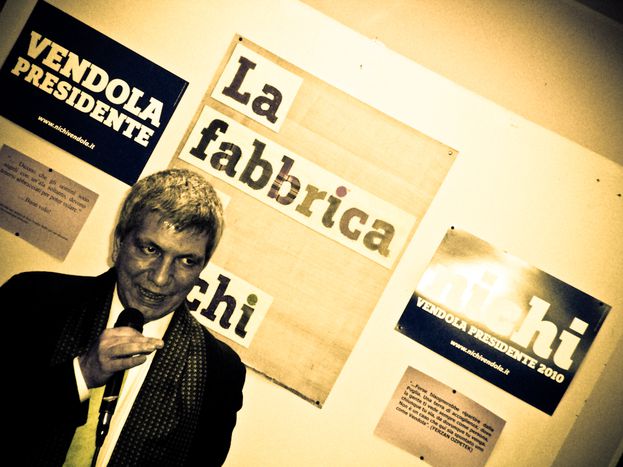
Nichi Vendola: is communism the only alternative to Berlusconi?
Published on
Translation by:
 Neil Saddington
Neil Saddington
He's catholic, homosexual, a communist, an environmentalist and an opposition candidate to Silvio Berlusconi in the yet-to-be-decided primary elections. In the face of negative forecasts and senior party officials he's a two-time winner of the regional elections in Puglia, and the 52-year-old has noticeable support for his ideas
Almost a year ago, he opened his regional party offices and think-tanks ('Fabbriche di Nichi') across Puglia, before expanding across Italy and now the world: the phenomenon has gone truly global, covering amongst others Berlin, Barcelona, London, Vienna, New York, Lusaka and most recently Paris. Nichi Vendola is a poet and politician but above all, a bureaucrat. He announced his candidacy for the elections against Silvio Berlusconi in a bid to 'unsettle the centre-left' on 15 July, during the closing statement to the general congress of the factories of Nichi. And so it was… with a feeling of determination at easing the impasse evident within the biggest centre-left party in Italy, he caused debate within his own. For some, he represents the embodiment of the coming together of the two sides of the centre-left, the socialist with the catholic. For others, though, he is nothing more than a charlatan, hiding behind poetry and rhetoric; or the advocate of a type of leadership the left just doesn’t need; or worse, a 'Red Berlusconi'. In 2012, the results of the primary elections will gauge the true public opinion so that counter-attacks can be planned.
'Factories'
But if you are looking for the Cavaliere’s alter ego in Vendola, you have him much mistaken. Despite a mutual way with words, there are strong differences between both with regards to their approaches to populism. According to Vendola, 'my belief is of an anti-populist populism. Populists talk from the gut, saying that gypsies are the enemy, merely because it is a popular ideology. I, on the other hand, am a populist who says that foreigners represent an important human, cultural and economic resource for us'. He closely follows by explaining how in 'Berlusconism, all power comes from an idea, a misleading dream, that he has successfully gifted to all Italians: a misguided feeling of well-being. He has managed this through the TV, newspapers and all other forms of communication at his disposal.'
In terms of strategy, his winning combination is facebook and video addresses
Vendola's regional victories are numerous; the most important though being 'not just any region but Puglia, a traditional right-wing seat with educated voters'. After years spent travelling up and down the heel of Italy, spending time listening to stories, Vendola has a deep understanding of how to stir up emotion during his speeches and light the touch paper of hope amongst the most sceptical of voters. In terms of strategy, his winning combination is facebook and video addresses, poetry slogans and 'factory' social networking. The latter started life as regional electoral committees, but have in recent years evolved into 'social networks' according to Vendola himself, 'interwoven with a passion for politics'. They are places of creativity, social and cultural endeavour, alternatives to traditional party offices, kept running by young people who identify with Nichi.
Brain gain Puglia
Perhaps, though, more than strategist and communicator, the greatest feature is Vendola the bureaucrat. Thanks to him, in the Gomorra-esque south of Italy, you find a land which has succeeded in detaching itself from the world viewed by writer Roberto Saviano, thereby transforming itself into a pillar of virtue. Vendola’s Puglia has become a champion of environmentalism (lowering the Ilva Steelworks CO2 emissions at Taranto and leaning now towards photovoltaics), clean public drinking water (spear heading the on-going publicity for Acquedotto Pugliese Spa), permanent employment contracts (including the so-called 'internationalisation' criticised and then blocked by the Italian government). Above all, in the words of Vendola himself, 'putting young people at the heart of the region (if not at the heart of an entire nation) in which youth politics do not exist'. The 'main actors' ('Principi Attivi') funding scheme, for example, offers young people the possibility of receiving a grant of 25, 000 euros to fund a start-up project of their choice. With the 'ethical contract' (Contratto Etico), Puglia's youth can receive a grant to cover the study of a masters or similar degree abroad, upon the condition that they return to the region upon completion and offer their skills to the community that gave them the opportunity.
There has also been a true miracle: the return of Giuseppe Beccia, the first Italian case of the reversal of the brain drain. Italy has done little to stop trained professionals from leaving the country. A few months ago, Giuseppe decided to give up his post and not renew his PhD grant in Brussels, so he could return to his cittadina pugliese or little city in Puglia and work with friends on a Principi Attivi-funded project. 'It is not Nichi Vendola who has made me come home, because I am sure that Vendola himself is not the solution to the problem - I hate the whole leadership concept,' explains Giuseppe. 'It's more the story of hope that is building in Puglia, that opportunity to build my life, at home, that is what made me want to return. Because in Puglia today, if you’re worth something and you have a skill, some will tell you: Go on, we'll give you a try!'
The greatest achievement of Vendola, in a nutshell, is how he has given space and opportunity to a parallel Italy. This exists within what can easily be defined as 'Berlusconi's Italy'; an Italy created, in the first instance, through local politicians, unknown artists, local business men and entrepreneurs, or scholars and scientists who fled abroad and who one day, you find on the cover of an English magazine.
Image: (cc)paride de carlo/ Flickr
Translated from Nichi Vendola: l'unica alternativa al berlusconismo?


